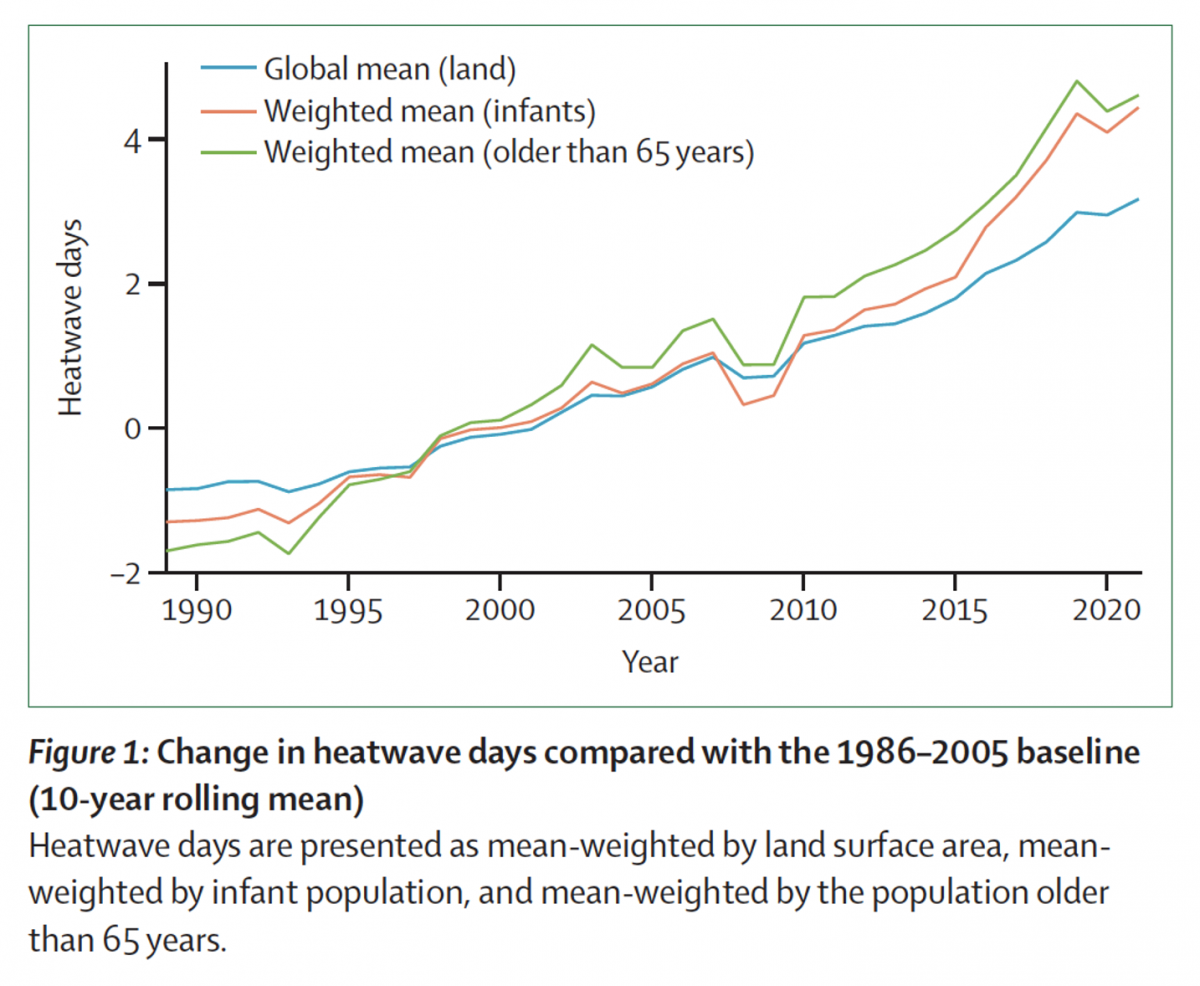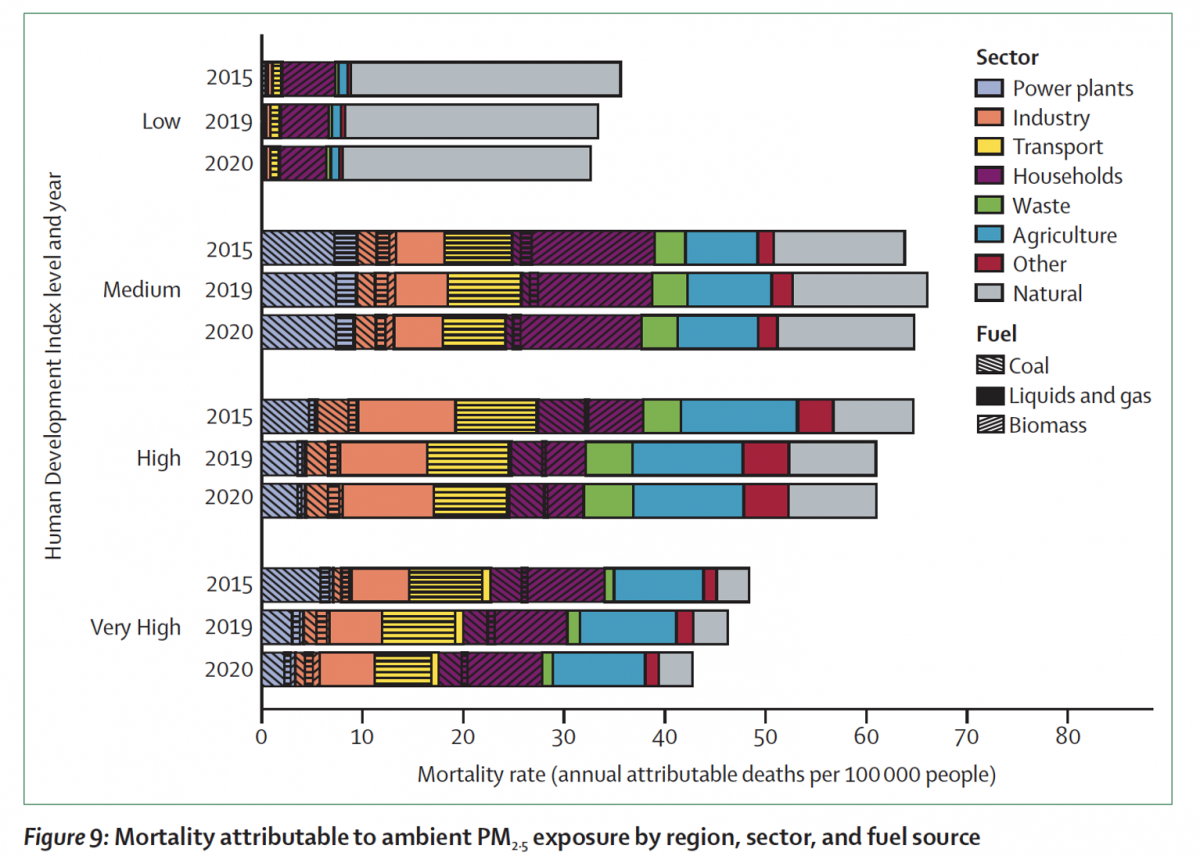Climate change impacts on health growing more deadly, says the Lancet Countdown
31st October 2022

31st October 2022
“At 1·1°C of heating, climate change is increasingly undermining every pillar of good health and compounding the health impacts of the current COVID-19 pandemic and geopolitical conflicts,” says the seventh edition of the report, Health at the mercy of fossil fuels, in what it calls its most dire findings to date.
Inaction on climate change has major health costs. According to the report, fossil fuels contributed to 1.3 million deaths from outdoor air pollution (via exposure to tiny particles that cause cardiovascular and respiratory disease, and cancers, known as PM 2.5) in 2020; overdependence on solid fuels, worsened by the energy crisis, increased exposure to indoor air pollution, and consumption of carbon-intensive meat and dairy resulted in 2 million deaths in 2019.

Other impacts of the relentless rise in temperatures include, for example:

“Governments continue to subsidise fossil fuels to a sum of hundreds of billions of dollars annually – for sums comparable to their total health budgets. Meanwhile, a profound lack of funding undermines a just transition towards affordable, healthy, zero-carbon energy,” adds the website of the 2022 report.
As to health impacts, the Lancet notes that regular physical activity contributes to a healthy bodyweight, improves physical and mental health, and helps to prevent many NCDs. But with temperatures rising, “high heat posed at least a moderate heat stress risk during light outdoor physical activity, for 281 hours more per person per year, on average (a 33 percent increase) compared with 1991-2000.”
Mental health is also being impacted, says the document. “Acute temperature increase, heatwaves, and humidity have been associated with worsened mental health outcomes and increased suicidality.”
Indirectly too, climate change can impact mental health. For example, hazards such as droughts can “disrupt agricultural production, affect livelihoods, and cause food and water scarcity and other hardships that affect family relationships, increase stress, and negatively impact mental health, with differences between genders.”
Current spending priorities are wrong, says the report. “Governments continue to subsidise fossil fuels to a sum of hundreds of billions of dollars annually – for sums comparable to their total health budgets. Meanwhile, a profound lack of funding undermines a just transition towards affordable, healthy, zero-carbon energy,” adds the report’s website.

The report notes that fossil fuel dependence “not only undermines global health through increased climate change impacts, but also affects human health and wellbeing directly, through volatile and unpredictable fossil fuel markets, frail supply chains, and geopolitical conflicts. As a result, millions of people do not have access to the energy needed to keep their homes at healthy temperatures and preserve food and medication.”
Despite the catastrophic effects of climate change, an alternate path is available. “While a renewed overreliance on fossil fuels could lock in a fatally warmer future with exacerbated health impacts,” says the Lancet, “a health-centred, low-carbon response offers a renewed opportunity to deliver a future in which world populations can not only survive, but thrive.”
Part of that positive response would be accelerating the transition to balanced and more plant-based diets, says the report. This “would reduce the burden of communicable and non-communicable diseases, reducing the strain on overwhelmed health-care providers.”
Another positive outcome of the transition would be reduced agricultural emissions — mostly methane from cows and changes to land use — and “important health co-benefits from improvements in dietary risk factors and mortality from non-communicable diseases.”
The report does deliver some good news. For example, the 12 million employees working directly and indirectly in renewable energy in 2020 exceeded direct employment in fossil fuel extraction for the first time in 2020. Notably, “employees in fossil fuel extraction industries, particularly coal mining, can have a greater incidence of non-communicable disease than the general population,” adds the report.
The Lancet Countdown: Tracking Progress on Health and Climate Change was formed in 2016, beginning with a public consultation to identify key areas of health and climate change to track and monitor. It describes itself as a collaboration of over 120 leading experts from academic institutions and UN agencies across the globe, including climate scientists, engineers, energy specialists, economists, political scientists, public health professionals and doctors.